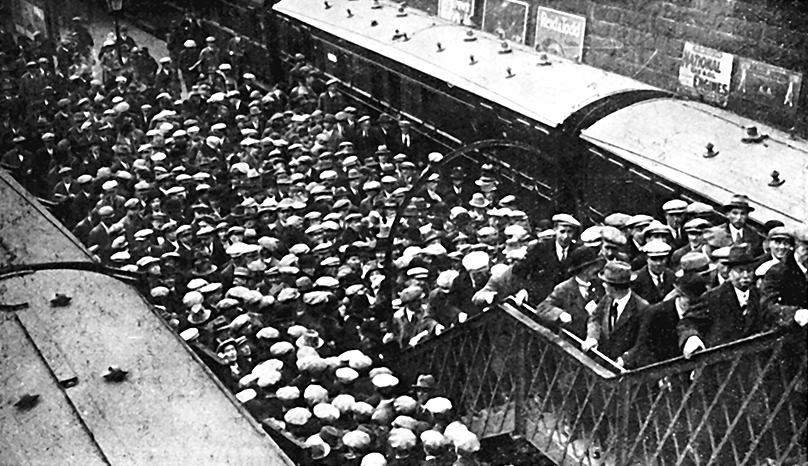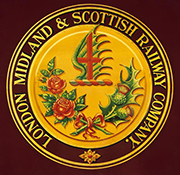

This site uses non-intrusive cookies to enable us to provide a better user experience for our visitors. No personal information is collected or stored from these cookies. The Society's policy is fully explained here. By continuing to use this site you are agreeing to the use of cookies.
[as described in the May 1931 edition of the “in-house” LMS Magazine.]

Detraining At Mount FloridaCourtesy: The Bulletin
THE ambition of every Mohammedan is to reach Mecca, and pilgrimages to the tomb of the Prophet take place every year to enable the devout to realise it. Pilgrimages are, however, not confined to Mohammedans, and the Mecca of the football enthusiast is the International Football Match which is played in England and Scotland on alternate years. There thousands repair to pay their homage to what to them, for the time, is their god in life.
This year's International Match was played on Saturday, March 28, at the famous Hampden Park ground, Glasgow, which it is estimated will accommodate 139,000 people, including 8,400 in the Grand Stand and 4,000 in the enclosure.
The computed official figures of the football pilgrims who gathered at Hampden on this occasion amounted to almost 130,000, which was a record for a football match, and to an onlooker it seemed as if the whole of the ground, except the part reserved for the players, was a sea of faces
The Mohammedans make their trek to Mecca by camel or on foot, but the more fortunate football fan attending the International Match at Hampden Park had the choice of 'bus, tram, rail, or taxi, in addition to the means with which Nature had provided him.
As the L M S handles a very considerable portion of the football traffic, a description of the method of dealing with it will, no doubt, be of interest.
Excursion trains totalling 218 were run from England and all parts of Scotland to Glasgow, no fewer than 16 arriving at Central and St. Enoch stations from London, Liverpool, Huddersfield, Gresley, Nottingham, and Luton in the early morning, while "Hicklings" ran a guaranteed excursion from Woodville to Edinburgh, where a few hours were spent before proceeding to Glasgow for the football match. Some of these trains included third class "sleepers," passengers appreciating the comfort to be had in such vehicles on long journeys of this kind, while others included saloons and vestibule carriages with tables, which were convenient either for having refreshments or for card playing.
Three excursion trains arrived at Buchanan Street in the early morning from Wick and Inverness, while later in the forenoon trains arrived at the same station from Blair Atholl, Aberdeen, Dundee, and Oban.
Long-distance trains from Annan, Dumfries, Kirkcudbright, Portpatrick, and Whithorn also arrived at St. Enoch during the course of the forenoon.
It will be appreciated that with so many long-distance trains from the South and North a great deal of organisation and preparation was necessary, such as cleaning, filling lavatory tanks, charging with gas, and ensuring that all vehicles were in good running condition. Arrangements had also to be made for these trains to be cleaned and lavatory tanks refilled for the return journey. The number of empty bottles removed . was amazing, and showed that the owners were well fortified for the day's outing.
The football match was timed to start at 3 o'clock, but hours before that enthusiasts were finding their way to the field in order to get a good standing place to view the game. About mid-clay the traffic by road and rail commenced, and unti l 3 o'clock all roads led to Hampden.
Mount Florida station on the Cathcart Circle railway, and King's Park station on the Burnside line, are in close proximity to Hampden Park, and are conveniently situated for dealing with football crowds. Prom outlying districts in Stirlingshire, Dunbartonshire, Lanarkshire. and Ayrshire, special trains were run direct to King's Park, fourteen being run to the Down platform and six to the Up platform.
The carriages of the trains which arrived at the Up platform were run forward to Carmyle for storage, while those arriving at the Down platform were run forward to Muirend, Whitecraigs, Neilston, and Lyons Cross.
The greatest volume of passenger traffic was from the centre of the city to Hampden, and the Railway Company conveyed about 20,000 passengers from Glasgow (Central) to Mount Florida between the hours of 12.45 p.m. and 2.35 p.m. at intervals of from three to five minutes.
Trains from Glasgow (Central) to Mount Florida, as well as to Ardrossan line, pass over the Outer Circle of the Cathcart railway, while trains from and to East Kilbride branch pass over the same section of the line between Eglinton Street Junction and Glasgow Central. As there is a heavy suburban traffic on the Cathcart Circle line, it was arranged that from 1 p.m, till 5 p.m. the East Kilbride trains would be diverted to and from St. Enoch station, to permit of the Cathcart service of trains being altered and augmented to cope with the football traffic.
On such occasions the football trains are run from Glasgow to Mount Florida principally over the Outer Circle of the Cathcart line, this being the more direct, viz., 2¾ miles as compared with 5¼ by Inner Circle. The trains, after being emptied at Mount Florida, can be run right forward round the Circle back to Glasgow (Central) to form other trains, or to storage sidings at Cathcart North, Muirhouse, Scotland Street Junction, and Kinning Park.
On this occasion 23 special trains were run via the Outer Circle and 18 via the Inner Circle from Glasgow (Central) to Mount Florida, and in order to facilitate the despatch of these, special permission was given for the empty carriages to form two such trains to be propelled coupled together from the Smithy Lye Carriage Depot to Glasgow (Central) with the engine of the leading train in the centre and the engine of the second train assisting in rear, thus making the trains ready for despatch, two at a platform, without further shunting. A guard travelled in the leading brake of the first train, whose duty it was to keep a sharp lookout and hand signal to the driver as might be necessary.
The return traffic requires to be handled expeditiously and trains despatched immediately they are filled, otherwise serious congestion would arise.
The Mount Florida to Glasgow return traffic was dealt with on the inner Cathcart Circle line and the tickets collected at Glasgow Central. Just before the end of the match, under a special arrangement, twenty trains were placed on the Inner Circle almost buffer to buffer, and when the crowds arrived, as soon as one train was filled another was drawn forward to the platform. Other three trains were run back from Glasgow (Central) to form additional specials, while to relieve the Inner Circle, two trains were run via the Outer Circle, although passengers were dubious about taking the longer route.
Notwithstanding the frequency of the service, the crowds rushed to the compartments almost before the trains came to a stand, with the result that passengers got jammed at the doors, whereas, had they kept cool and orderly, they would have entrained quite easily.
On the streets above the station, the City and Railway Police regulated the crowds into queues leading to each of the two station stairways, which was an admirable arrangement, as it enabled passengers to come quite orderly down these on to the platform. At one period the crowd became rather lively and the pressure at the head of the stairway became acute. The police endeavoured to hold them back, but had ultimately to get the assistance of two mounted police, whose well-trained horses, nosing into the crowd soon recalled them to order. The stairways being at each end of the platform distributed the passengers to both front and rear of the trains, and with such celerity was the traffic dealt with that a train was despatched to Glasgow every three minutes over a period of 71 minutes. Meanwhile, the queues on the streets were gradually moving forward, railwaymen in uniform alongside selling tickets to those who had not provided themselves with a return ticket, and no fewer than 4,250 tickets were sold in this manner.
At King's Park Station on the Burnside line, similar crowds were handled, the trains from there being despatched to Maryhill, Fauldhouse, Motherwell, Hamilton, Coatbridge and Lanark on the Up platform and to Kilmarnock on the Down platform.
Meanwhile, at Glasgow Central the traffic was being dealt with as expeditiously as at Mount Florida and King's Park. With such a large number of trains arriving in such a limited space of time, four platforms had to be set apart for their reception, and as soon as the passengers were detrained and the carriage doors closed, the trains were propelled to Bridge Street Junction and Smithy Lye on No. 5 Up line. This arrangement was also specially authorised, and the trains were signalled on the block instrument by a special bell code, the signalman at Bridge Street only accepting them when the road was clear to the starting signal ahead.
A great number of the passengers who travelled from Mount Florida to Glasgow Central as well as those who had found other means of transit from Hampden now began to congregate at Central, St. Enoch, and Buchanan Street stations, and additional trains were run to the outlying towns.
The long-distance passengers had, however, to see the sights of the city, before returning, and it was from 9 p.m. till after midnight that the trains left the three termini for the far North in the one direction and the far South in the other, some of them not being due to reach their destination until Sunday forenoon.
The provision of the engine power, carriages, and guards, to meet the additional passenger trains and the empty carriage trains run to and from the depots before and after the match required to be very carefully followed out. So far as the carriages were concerned, the first consideration was the best use that could be made of arriving trains at Glasgow (Central) in order to obviate the bringing in of trains from depots and the running off of others. Ordinary train sets of carriages were made use of when available, and special sets were provided to cover the balance.
On the Northern Division, both Westinghouse and Vacuum brakes are in operation, and care had to be exercised that suitably fitted engines were provided. The ordinary diagrammed work of quite a number of engines and guards working into Glasgow in ordinary course, did so by different routes on this date, with the result that they were not available to work out the trains which they would have done under ordinary working, and arrangements were made to meet this. The majority of the engines and guards required for the additional trains was supplied from the Polmadie depot, while the trains from a distance were provided for by the depots nearest the starting and finishing points.
The elaborate preparations made beforehand enabled the arrangements to be carried out without a hitch of any kind, and credit is due to every member of the staff concerned for the keen and almost personal interest taken in the matter.
Site contents Copyright © LMS Society, 2024

April 25th, 2024
Site contents Copyright © LMS Society, 2024